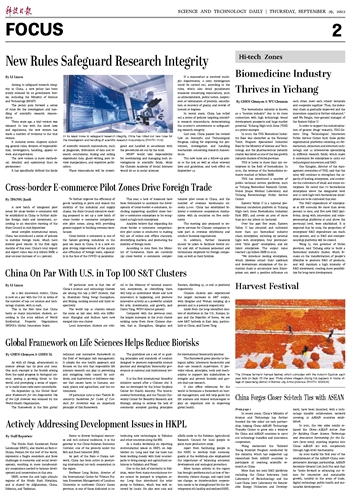
 New Rules Safeguard Research Integrity
New Rules Safeguard Research Integrity Biomedicine Industry Thrives in Yichang
Biomedicine Industry Thrives in Yichang Cross-border E-commerce Pilot Zones Drive Foreign Trade
Cross-border E-commerce Pilot Zones Drive Foreign Trade China On Par With U.S. in Top 100 S&T Clusters
China On Par With U.S. in Top 100 S&T Clusters Global Framework on Life Sciences Helps Reduce Biorisks
Global Framework on Life Sciences Helps Reduce Biorisks China Forges Closer Sci-tech Ties with ASEAN
China Forges Closer Sci-tech Ties with ASEAN Actively Addressing Development Issues in HKPL
Actively Addressing Development Issues in HKPL Harvest Festival
Harvest Festival
 |
| In its latest move to safeguard research integrity, China has rolled out new rules for the investigation and handling of scientific research misconducts. (PHOTO: VCG) |
Aiming to safeguard research integrity in China, a new policy has been jointly released by 22 government bodies, including the Ministry of Science and Technology (MOST).
The policy puts forward a series of rules for the investigation and handling of scientific research misconducts.
Three years ago, a trial version was released. In line with the latest laws and regulations, the new version has made a number of revisions to the trial version.
It includes seven chapters including general rules, division of responsibilities, investigation, handling, appeal review, and supervision.
The new version is more methodical, detailed, and operational than its predecessor.
It has specifically defined the kinds of scientific research misconducts, such as plagiarism, fabrication of data and research conclusions, buying and selling experiment data, ghost-writing, peer review manipulation, and repetitive publication.
These misconducts will be investigated and handled in accordance with the procedures set out by the rules.
MOST would take responsibility for coordinating and managing such investigations in scientific fields, while the Chinese Academy of Social Sciences would do so in social sciences.
If a misconduct is involved multiple departments, a joint investigation could be carried out, according to the rules, which also detail punishment measures concerning misconducts, such as admonishment, public notice, suspension or termination of projects, cancellation or recovery of grants, and revoke of honors or degrees.
In recent years, China has rolled out a series of policies targeting scientific research misconducts, demonstrating the country's commitment to safeguarding research integrity.
Last year, China passed the revised Law on Scientific and Technological Progress, calling for improving the prevention, investigation and handling mechanism concerning research misconducts.
The new rules are a follow-up policy to the law, as well as other relevant laws and guidelines, and took effect on September 14.


 Next
Next



